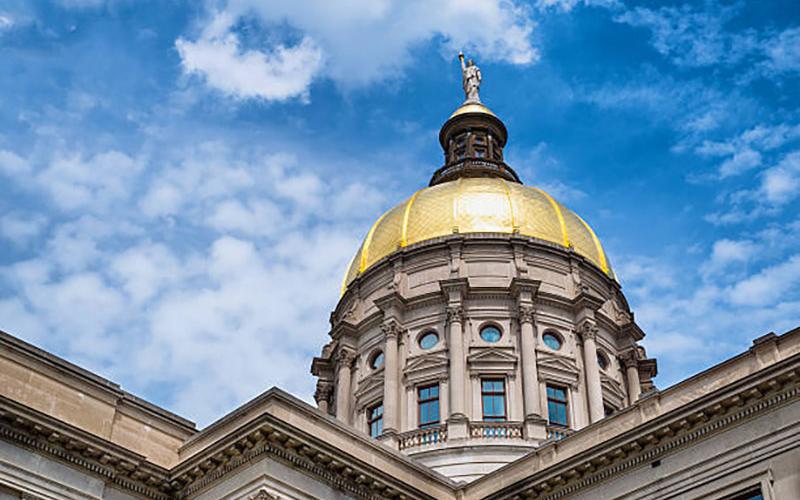Crossover Day has come and gone in the General Assembly this year, with some bills making the deadline to remain eligible for passage in 2024 and others falling by the wayside.
Significant progress has been made on sports betting and reforming Georgia's Certificate of Need (CON) law governing hospital construction.
Lawmakers have taken steps toward reining in state tax incentives that attract jobs but cost Georgia taxpayers, starting with the popular but expensive film tax credit. After years of inaction on tort reform, lawmakers have passed a bill aimed at a narrow aspect of the issue.
But there was no action before Crossover Day on private school vouchers, another priority of Gov. Brian Kemp and legislative Republicans that has failed to make it through the General Assembly for years. And legislation making sweeping changes to Georgia's election laws also did not survive Crossover Day.
Last Tuesday's 41-12 vote in the state Senate in favor of a constitutional amendment asking voters whether to legalize sports betting in Georgia represents the most progress legalized gambling has made in the General Assembly. Senators already had passed an "enabling" bill spelling out how sports betting would be operated in the Peach State.
Any lawmakers who might be wavering on sports betting could be convinced to support the constitutional amendment because it puts the question in the hands of Georgia voters.
"I trust the people of Georgia to make the right decision," said Sen. Carden Summers, R-Cordele.
The most significant CON reform legislation in years also won passage in the state House of Representatives on Tuesday, billed as a compromise between doing nothing and repealing the law entirely.
The bill would accelerate the state's review of CON applications, remove spending thresholds governing hospital construction projects and raise the cap on the state tax credit supporting rural hospitals from $75 million a year to $100 million.
"Given the rapid evolution of health care in this country, we need to look for ways to make health care accessible and affordable," said Rep. Butch Parrish, R-Swainsboro, the bill's chief sponsor, who chaired a special committee on health care last year.
The most popular state tax incentive, the film tax credit, appears to be in for a haircut.
The House passed legislation on Crossover Day setting up 10 criteria to qualify for the richest form of the tax incentive. Film producers who can meet at least four of the 10 would be eligible for a 30% credit.
While the film tax credit is largely responsible for making Georgia a world leader in the industry, its fiscal impact of $1 billion a year makes it by far the most expensive tax incentive in the state's job-attracting arsenal.
The legislation is likely to draw major pushback from the industry as it moves over to the state Senate. Opponents argue it would threaten the future viability of film and TV productions in Georgia at a time the Peach State has risen to third in the world.
Kemp put the brakes on an expected push for comprehensive tort reform at the start of the 2024 legislative session when he declared it too heavy a lift for one year. Instead, the Senate passed a narrowly focused bill last month to limit the ability of plaintiffs in lawsuits against commercial truckers to file suit directly against a trucking company’s insurance carrier.
Tort reform advocates could take solace that some progress is being made on their issue. Not so for Republican supporters of major changes to Georgia's election laws. Crossover Day came and went without the Senate taking up legislation making it easier for individuals to file voter challenges and doing away with automatic voter registration.
GOP Secretary of State Brad Raffensperger responded quickly late Thursday night after the House failed to muster the two-thirds vote necessary to pass a constitutional amendment declaring only U.S. citizens could vote in Georgia elections. House Resolution 780 picked up 98 votes in the final vote taken on Crossover Day, well short of the 120 needed to pass a constitutional change.
"The border crisis and the (Biden) administration's failure to act make it necessary for Georgia to take swift action," Raffensperger said. "Multiple organizations with ties to Democrats are currently suing to end critical citizenship verification in our registration process, potentially exposing our elections to foreign interference, and diluting the power of legally restricted voters."
Voting rights advocates celebrated the defeat of the most far-reaching elections law changes.
"Mass voter challenges are a recent phenomenon that allow any Georgia citizen to question the validity of voter registrations across the state," said Joey McKinnon, executive director of the group Georgia Values Action. "That's not concern over election integrity. It's a way to cast a cloud of suspicion over honest Georgia voters and create a false narrative."
While Republicans could take heart that the constitutional amendment limiting voting to U.S. citizens at least made it to the House floor, a private-school voucher bill that cleared the Senate's GOP majority along party lines last year hadn't shown up at all through Crossover Day.
The issue isn't polling well with Georgia voters. A poll released on Tuesday by the Georgia Budget and Policy Institute found most registered voters in Georgia oppose vouchers.
But school-choice advocates needn't be completely discouraged. Like any other measure that failed to survive the Crossover Day deadline, vouchers still could emerge during the 2024 legislative session's final weeks by being attached to another bill that remains alive in either the House or Senate.

